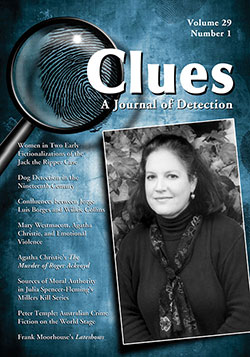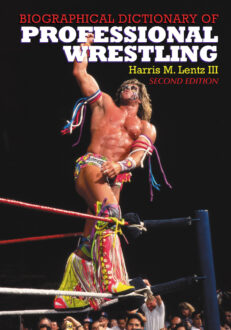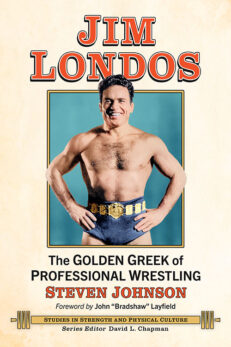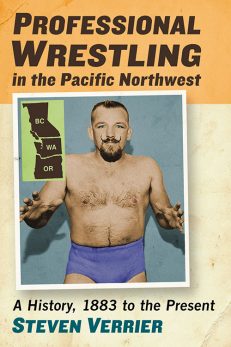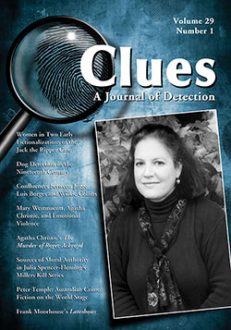Clues: A Journal of Detection, Vol. 29, No. 1 (Spring 2011)
Print Back Issue$30.00
In stock
About the Book
BACK ISSUE
This is a single back issue only. To order a current subscription, or for more information, please visit the journal’s web page at CluesJournal.com. Back issues from earlier volumes of Clues are available for order subject to availability. Also, single issues of the current volume may be ordered one at a time. Individuals may order back issues directly from our online catalog, and the charge for individuals is $30 (excluding postage). Issues from Volume 33 to the present are also available in ebook format on Kindle, Nook and Google Play.
The charge for single issues for institutions is $75 per issue (excluding postage). If your institution requires a back issue, please contact us to order at the appropriate rate.
About the Author(s)
Bibliographic Details
Executive Editor Margaret Kinsman
Managing Editor Elizabeth Foxwell
Format: softcover (7 x 10), back issue
Pages: 120
Bibliographic Info:
Copyright Date: 2011
ISSN 0742-4248
Imprint: McFarland
Table of Contents
A Bloody Pulp: Women in Two Early Fictionalizations of the Jack the Ripper Case
ELYSSA WARKENTIN 5
The author examines two of the earliest published fictionalizations of the Jack the Ripper murders of 1888. Through close readings and gender analysis, she argues that these early pulp mysteries simultaneously reproduce and complicate late–Victorian dominant cultural narratives of the murders, which blame the female victims for the actions of their killer.
The Hounds of Fortune: Dog Detection in the Nineteenth Century
KATE WATSON 16
The author examines the canine in detective fiction in the nineteenth century. More specifically, she concentrates on the inception of this figure in the midcentury, arguing that the creator of the canine detective was the Australian writer Mary Helena Fortune.
Critique of Pure Reason: Confluences between the Works of Jorge Luis Borges and Wilkie Collins’s The Moonstone (1868)
LINDA S. MAIER 26
The author explores parallels between works of Argentine short story author Jorge Luis Borges and Wilkie Collins’s novel The Moonstone. This analysis reveals how both authors subtly subvert detective fiction prototypes to challenge stable meanings and traditional paradigms, thus anticipating the crisis of absolutes characteristic of modernist and postmodernist fiction.
A Hidden Body in the Library: Mary Westmacott, Agatha Christie, and Emotional Violence
SARAH E. WHITNEY 37
Agatha Christie composed six romantic novels as Mary Westmacott. These books, little read today, argue that emotional violence should be taken as seriously as physical violence. Reading the two bodies of work together provides fresh insight into the themes that Christie found compelling throughout her literary career.
An “Investigation in Pragmatics”: Agatha Christie’s The Murder of Roger Ackroyd
EMANUELA GUTKOWSKI 51
The author analyzes the misuse of the cooperative principle in Agatha Christie’s The Murder of Roger Ackroyd. Without any “lies,” the narrator violates the maxims of quantity, quality, manner, and relation through omissions, ambiguities, incorrect amounts of information, and voluntary confusion between “report” and “novel,” thus leading the reader to a false conclusion.
Gerhard Roth’s Orkus Novels The Lake, The Plan, The Mountain, and The Stream as Murder Mysteries
PAMELA S. SAUR 61
Contemporary Austrian author Gerhard Roth creates the eeriness and suspense of murder mysteries while demonstrating limitations to mystery patterns of clue gathering and code-breaking. In four novels in his Orkus cycle, mysteries, never completely solved, are intertwined with psychological odysseys, travel narratives, and encounters with death experienced by Austrian male protagonists.
Peter Temple: Australian Crime Fiction on the World Stage
STEPHEN KNIGHT 71
Australian crime fiction has long-standing local success, but limited international impact. Peter Temple has gone further both through his innate skills and because he has meshed Australian anti-authoritarianism and landscape-linked writing with interrogative approaches like that of James Ellroy. This occurs in the Jack Irish series, but more powerfully in some of his nonseries novels that lead up to the worldwide successes of The Broken Shore and Truth.
“Reading Detective Fiction” or Writing It? Frank Moorhouse’s Lateshows
JANICE SHAW 82
The author discusses Australian writer Frank Moorhouse’s exploration of the crafting of literature and the writer’s function through the use of the detective genre in Lateshows. He contrasts the whodunit as an authorcentric and -dominated form with the discontinuous narrative, in which forms such as the short story and autobiography are interrelated.
Do the Right Thing: Sources of Moral Authority in Julia Spencer-Fleming’s Millers Kill Series
RACHEL SCHAFFER 93
In Julia Spencer-Fleming’s mystery series Episcopal priest Clare Fergusson and sheriff Russ Van Alstyne struggle not just to solve crimes and right wrongs but also deal with the ramifications of their own deepening relationship. While Clare, as a believer, has more sources of moral authority on which to draw, the equally moral nonbeliever Russ shares one source, reason, with her.
Surviving the Storm: Detecting Crime in Post-Hurricane Katrina Fiction
MARIA HEBERT-LEITER 102
In 2005, the city of New Orleans and its literature were irrevocably changed. The author studies the new type of New Orleans mystery spawned by the Katrina disaster, because authors cannot fully capture the crimes of the city without addressing this particular tragedy and the horrors that followed.
BOOK REVIEWS
Nels Pearson and Marc Singer, eds. Detective Fiction in a Postcolonial and Transnational World and Marieke Krajenbrink and Kate M. Quinn, eds. Investigating Identities: Questions of Identity in Contemporary International Crime Fiction. STEPHEN KNIGHT 114
David Morrell and Hank Wagner, eds. Thrillers: 100 Must-Reads. RACHEL SCHAFFER 116
Author Guidelines are on page 119
Book Reviews & Awards
- “Clues is a must-have for readers and writers of crime fiction. Scholarly, thought-provoking, wide-ranging in its topics, Clues covers the crime and thriller map.”—Sara Paretsky
- “A. Conan Doyle, notoriously resentful of Sherlock Holmes’s success, liked to scorn ‘police romances’ as less significant and worthy of his talents than his other literary work. If he could have read Clues, the thinking mystery reader’s journal, he would surely have felt differently—and learned much he never realized himself about even his own landmark contribution to the genre, from which so much else by others has flowed.”—Jon Lellenberg, U.S. agent for the Arthur Conan Doyle estate
- “I love reading Clues. Every issue provides thought-provoking, well-researched articles. The variety and scope of the material found in Clues makes an unparalleled, ongoing contribution to our understanding of the role of crime fiction in our culture, and the genre’s reflection of its time and society.”—Jan Burke, Edgar-winning author of The Messenger (2009)
- “Clues is an important journal. It carries the torch of tradition that is the backbone of detective fiction. It goes below the surface and gets to the heart of what makes the genre so fascinating and valid today”—Michael Connelly, author of the Harry Bosch novels, including The Overlook (2007)
- “for erudite and fascinating truths about mysteries, follow the clues to Clues, the scholarly journal that is an essential resource for every serious student of the mystery”—Carolyn Hart, author of Death Walked In (2008)
- “with scholarship ranging from Poe to Peters, nothing beats Clues”—Joan Hess, author of Mummy Dearest (2008).


